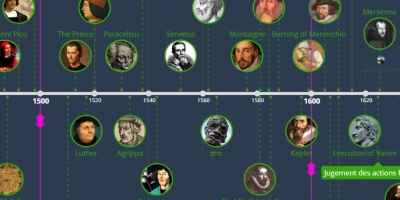jan 4, 1530 - Paracelsus
Description:
A. While the learned Agrippa admired the classical tradition, Paracelsus largely despised it; the central feature of Paracelsus is his iconoclasm (often seemingly for its own sake). 1. He violently assailed medical authorities (classical and contemporary). 2. He often rejected “foreign” medicaments, institutions, and ideas in favor of native Germanic ones (he was Swiss). 3. He likewise ***rejected Scholastic argument and method and university learning***. 4. His ill temper and violent outbursts made him many enemies and prevented him from finding a settled residence. 5. Unlike Agrippa, Paracelsus did not believe that texts were a satisfactory source of knowledge; experience in the world and in the fire of the chemical furnace were necessary. B. Paracelsus’ worldview was chemically based. Chemical processes stood as explanatory metaphors for the human body, the earth, and cosmic processes. 1. His system incorporated many natural magic notions, such as the use of amulets, the doctrine of signatures, the macrocosm-microcosm, and so on, but also often incorporated Germanic “folk wisdom” in opposition to more learned ideas. Spiritual powers were the cause of changes in the world—not the material interactions known to the Scholastics. 2. Paracelsian notions provided an alternative world system—contrary to that of Aristotle—as well as a medicine contrary to that of Galen. 3. Paracelsus expanded the older Islamic dyad of material principles (Mercury and Sulphur) by the addition of Salt (creating a “trinity”). The utility of chemistry for Paracelsus was as an adjunct to medicine; it could prepare remedies by the process of Scheidung (separating toxic parts from wholesome ones). 4. Many Paracelsian notions are bizarre and difficult to comprehend, indeed, they are often obscurantist; nonetheless, during his lifetime, he acquired a reputation for healing “incurable” diseases. C. Paracelsus’ ideas and writings are poorly organized, but after being rationalized by his followers, Paracelsianism gained a wide and influential following for more than a century. Many took it up on account of its iconoclastic elements; it was popular among non-university-trained medical practitioners, Protestants, and others outside the traditional university structure.
Added to timeline:

Frühneuzeit
Date:
Images:
![]()
